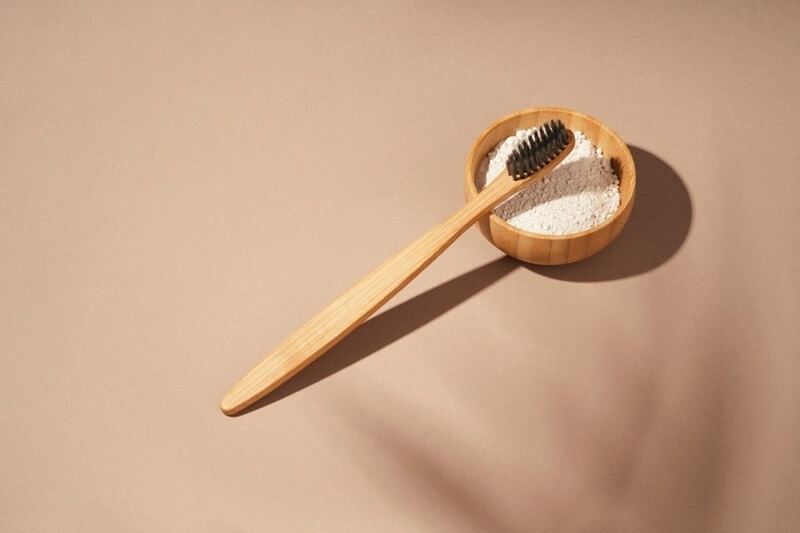
Let’s be honest—oral hygiene isn’t usually anyone’s favorite topic. Most people breeze through it in the morning, half-awake, just brushing quickly and maybe swishing some mouthwash. But have you ever stopped to think… what if we’ve been doing it all wrong? What if there’s more to oral care than toothpaste commercials and floss reminders?
Turns out, there is. And the answer might lie in something ancient—Ayurvedic oral hygiene. Unlike modern routines that focus only on surface cleaning, Ayurveda sees oral health as a reflection of your entire body’s balance. It’s not just about your teeth. It’s about your energy, your digestion, your age, and even your stress.
Sounds too deep for a morning routine? Don’t worry. It’s simpler (and smarter) than you think.

Ayurveda, the 5,000-year-old healing science from India, has always treated the mouth as a gateway. Everything you eat, breathe, or speak travels through it. So if your gums are inflamed or your breath is off, Ayurveda doesn’t just blame leftover food—it sees it as a sign of imbalance. It teaches that daily habits can either support or damage your well-being. And oral care? That’s a daily habit with long-lasting effects.
In today’s world, dental care is more advanced than ever. We’ve got whitening strips, electric brushes, smart flossers… and yet gum disease still affects nearly half of all adults. That number jumps even higher for people over 60. You’d think we’d have it figured out by now, but clearly something’s missing.
And here’s the real kicker—research now shows how poor dental hygiene is linked to serious health issues like heart disease, Alzheimer’s, and diabetes. That’s right. Your mouth could be setting the tone for your entire body.
This is exactly why Ayurveda’s slow, mindful approach suddenly feels way ahead of its time.
Why is good oral hygiene especially important for older adults? As people age, their oral health naturally becomes more vulnerable. Saliva production decreases, gums become more sensitive, and healing slows down. This makes older adults more likely to experience dry mouth, infections, and tooth decay. The usual brushing-and-rinsing oral hygiene routine order often isn’t enough anymore. That’s where Ayurvedic practices can shine. They’re gentle, holistic, and supportive in a way modern routines sometimes fail to be.
It’s not about ditching your dentist. It’s about giving your body the extra tools it needs—especially when it’s older and less resilient.
You don’t need to live in an ashram or grow your own herbs to follow this. Even if you’re rushing out the door in the morning, there’s a way to blend ancient wisdom with modern life.
It all begins with tongue scraping. Yes, scraping your tongue first thing in the morning removes built-up toxins—called ama in Ayurveda—and freshens your breath. It’s a tiny step that makes a big difference. Just grab a copper or steel scraper and gently clean your tongue a few times. Takes less than a minute.
Next comes oil pulling, which is probably the most famous Ayurvedic oral practice. It sounds weird if you’ve never done it, but swishing sesame or coconut oil in your mouth for five to ten minutes is like a detox bath for your gums. It draws out impurities, lubricates tissues, and helps prevent plaque and inflammation. People often report that their teeth feel smoother, and their breath gets fresher after just a few days.
Instead of the toothpaste aisle at your local pharmacy, Ayurveda recommends using herbal tooth powders or pastes made from ingredients like neem, babool, clove, or Triphala. These herbs have natural antibacterial and anti-inflammatory properties. They clean the teeth without the harsh chemicals often found in commercial toothpaste. You’re not just brushing—you’re nourishing your mouth.
For mouth rinsing, think beyond alcohol-based solutions. Ayurveda leans on decoctions of licorice, Triphala, or even mild infusions of clove and fennel. These support healing, reduce bacteria, and don’t strip your mouth dry like conventional products do.
Then there’s gum massage. Yep, actually using your fingers to rub your gums with herbal oil, like sesame or even a bit of neem oil. This improves circulation, strengthens gum tissue, and helps fight off infection. It sounds old-school, but it feels surprisingly nice and grounding.
On A Related Note: How to Improve Gum Health by Boosting Your Gut Health
Let’s talk plants. Neem is a bitter powerhouse that fights bacteria and soothes inflammation. It’s like nature’s mouthguard. Clove contains eugenol, a natural antiseptic that has been used for centuries to ease tooth pain and kill germs. Licorice root is sweet, but don’t be fooled—it’s great at preventing cavities and calming swollen gums. And then there’s Triphala, a mix of three fruits that helps detox your entire body and supports healthy tissues, including your mouth.
What’s incredible is that these aren’t just folk remedies. Modern science is catching up. Studies now confirm that many of these herbs are effective for gum health and reducing oral bacteria.
In Ayurveda, everyone has a unique constitution called a dosha—Vata, Pitta, or Kapha. And yes, your dosha can influence your oral health too.
If you’re Vata-dominant, you might struggle with dry mouth and sensitive gums. Warm sesame oil and calming herbs help here. Pitta types tend to get inflamed gums or mouth ulcers, so cooling herbs like licorice are your best bet. Kapha types might produce more mucus and be prone to plaque buildup, which means you’ll want stimulating herbs like clove or cinnamon to keep things moving.
Understanding your dosha makes your oral hygiene more than just a checklist—it becomes a personalised act of self-care.
An Ayurvedic approach offers a gentler and more sustainable option. Herbal infusions like Triphala tea or licorice decoctions can be used as a mouthwash for oral hygiene without any of the harsh side effects. They’re not just safer—they’re actually good for your tissues.
Let’s circle back to the big picture. Your mouth isn’t a separate system. Bacteria that grow there can travel into your bloodstream, affecting your heart, lungs, and even your brain. Poor oral hygiene has been linked to a greater risk of cardiovascular issues, diabetes complications, and even Alzheimer’s.
That makes oral hygiene overall health a conversation we should all be having—loudly.
And here’s the thing. Ayurveda knew this. It didn’t treat oral care like a chore. It treated it like an investment in your entire body’s well-being.
If this all feels like a lot, don’t panic. You don’t need to throw away your toothbrush or start grinding neem twigs from scratch. Just start with one step.
Tomorrow morning, try scraping your tongue before you brush. Maybe next week, add five minutes of oil pulling. Swap out your commercial toothpaste with an herbal one. Use a homemade rinse once in a while. Before you know it, you’ll have built a deeply healing routine without even realising it.
The key is to be consistent. Ayurveda doesn’t believe in quick fixes. It’s about slow, intentional care that adds up over time.
Now, if you’re skeptical, you’re not alone. Some people think Ayurveda is just folk medicine with no science behind it. But modern studies have proven that practices like oil pulling and herbal oral care can genuinely improve gum health and reduce inflammation.
Others think it’s time-consuming or complicated. But really, you’re already brushing and rinsing. This just swaps in better tools for the same steps.
And no, Ayurveda doesn’t suggest you ditch modern dentistry. Quite the opposite. It supports it. Think of Ayurvedic care as your first line of defense—and your daily prevention strategy.
Do Read: Enhance Clear Aligner Oversight with Candid Monitoring AI
Ayurveda doesn’t just clean your mouth. It reconnects you with your body. It helps you slow down, listen, and nourish. In a world where everything’s speeding up—including health problems—that kind of care is more valuable than ever.
Whether you’re 25 and curious or 65 and struggling with gum issues, Ayurvedic oral care offers something refreshingly holistic. It’s not about being perfect or following a rigid set of rules. It’s about paying attention to the signals your body sends—and giving it what it needs.
So, tomorrow morning, before you reach for your usual toothpaste and scroll Instagram, pause. Pick up a tongue scraper. Swish a little oil. Say hello to your gums. You might be surprised what they tell you back.
This content was created by AI